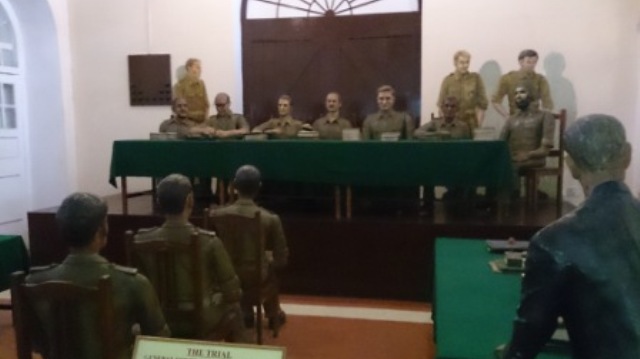Supreet Kaur
Military or armed forces are indispensable part of a sovereign state. It offers protection to the state against external aggression and helps in peacekeeping. Military too is governed by law like every other aspect of a state. But military is governed by it’s own law known as Military Law.
Military law is that law which regulates the conduct of those serving in the armed forces and are subjected to military courts rather than normal civil courts. So justice related to military matters is done in military courts and it is known as courts martial.
A military court conducts proceeding against the personnel of armed forces. The procedure is much similar to civil courts but the jurisdiction of a military court to subjected to conduct of military personnel.
The purpose of military courts is to enquire into the offence committed by military personnel and if the offence is proved, to grant the punishment as well so as to secure discipline in the conduct of military personnel.
However, Military court can’t try matters related to rape, murder or suicide.
MILITARY COURTS IN INDIA
In India we have Army Act, 1950 which provides for four types of court martial:
I. General courts-martial
II. District courts-martial
III. Summary general courts-martial
IV. Summary courts-martial
I. General Courts Martial: This court can enquire into the conduct of army personnel from the rank of soldier to an officer. It can award punishment of life imprisonment or even death sentence.
Composition: It consists of at least five officers.
Other conditions: The officers must have held a Commission for period of at least three years.
And at least four among those officers are of rank above that of captain.
Powers: It has power to conduct proceedings against any person subject to Army law and to give punishment as well.
II. District Courts- martial:
Composition: It consists of at least three officers who had held Commission for at least two years.
Powers: It has power to conduct proceedings and pass sentence.
Limitation on power: It cannot conduct proceedings against an officer or a person of JCO( junior commissioned officer) rank.
It can’t give punishment of death sentence or imprisonment above two years.
III. Summary General Courts-martial : This court tries offences committed in special areas like Jammu and Kashmir.
Composition : It consists of at least three officers.
Powers: It has powers similar to that of general courts-martial.
IV. Summary courts-martial: This court tries soldier with rank ranging between soldier and NCO.
Composition : This court can be constituted by a single officer but it is essential that the proceedings in such case are held in presence of other two officers.
Powers: It has power to conduct proceedings and to grant Punishment thereof.
Limitation on power: It cannot conduct proceedings against an officer , JCO or a warrant officer.
If summary courts-martial is conducted by a lieutenant colonel, he can award punishment upto one year.
If the officer is below the rank of lieutenant, he can give punishment only upto 3 months only.
DISSOLUTION OF COURT MARTIAL: The proceedings being conducted against any person subject to Army law may be dissolved if:
There is no minimum quorum to hold the proceedings.
If the officer conducting the court martial or the accused is ill and the proceedings cannot be conducted owing to this reason.
If the dissolution is required in case of military expediency etc.
CHOICE BETWEEN CRIMINAL AND MILITARY COURT
If the offense is such that both the criminal court and military court has jurisdiction to try that matter, it is the discretion of the commanding officer under whom the accused is serving, whether to approach military court or criminal court. If military court is chosen, the accused is taken into military custody.
Read more : what is court martial?

